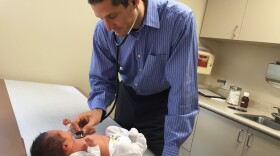Patti Neighmond
Award-winning journalist Patti Neighmond is NPR's health policy correspondent. Her reports air regularly on NPR newsmagazines All Things Considered, Morning Edition, and Weekend Edition.
Based in Los Angeles, Neighmond has covered health care policy since April 1987. She joined NPR's staff in 1981, covering local New York City news as well as the United Nations. In 1984, she became a producer for NPR's science unit and specialized in science and environmental issues.
Neighmond has earned a broad array of awards for her reporting. In 1993, she received the prestigious George Foster Peabody Award for coverage of health reform. That same year, she received the Robert F. Kennedy Award for a story on a young quadriplegic who convinced Georgia officials that she could live at home less expensively and more happily than in a nursing home. In 1990, Neighmond won the World Hunger Award for a story about healthcare and low-income children. She received two awards in 1989: a George Polk Award for her powerful ten-part series on AIDS patient Archie Harrison, who was taking the anti-viral drug AZT; and a Major Armstrong Award for her series on the Canadian health care system. The Population Institute, based in Washington, DC, has presented its radio documentary award to Neighmond twice: in 1988 for "Family Planning in India" and in 1984 for her coverage of overpopulation in Mexico. Her 1987 report "AIDS and Doctors" won the National Press Club Award for Consumer Journalism, and her two-part series on the aquaculture industry earned the 1986 American Association for the Advancement of Science Award.
Neighmond began her career in journalism in 1978, at the Pacifica Foundation's DC bureau, where she covered Capitol Hill and the White House. She began freelance reporting for NPR from New York City in 1980. Neighmond earned her bachelor's degree in English and drama from the University of Maryland, and now lives in Los Angeles.
-
The pressure, doctors say, is mostly coming from other parents who don't want their infants exposed to measles, whooping cough or other serious illnesses in the pediatric waiting room.
-
California health officials say more than 4 dozen cases of measles have been diagnosed in the state — a result of an outbreak that started at Disneyland. Most who got sick were not vaccinated.
-
Bariatric surgery works for severely obese patients because it shrinks the size of the stomach. But years later, the stomach starts to expand and some patients regain the weight they lost.
-
Working more than 48 hours a week makes risky drinking more likely, a study of people in 14 countries finds. And that held true for rich and poor, men and women.
-
Everyone knows it's dangerous to drink and drive, but a lot of people still do it. Strict enforcement of traffic laws makes it less likely that people will get behind the wheel when soused.
-
For some teenagers, parties with alcohol are almost a rite of passage. Surveys show the vast majority of parents in these homes know the alcohol is flowing. Cities are now cracking down on the adults.
-
There's not much evidence that radiation increases survival in older women with early-stage breast cancer, but doctors are still prescribing it. It can be hard to get doctors to change protocols.
-
Citing reduced risk of HIV and other sexually acquired diseases, the federal agency says health care providers should discuss circumcision with men as well as parents of infants and teen boys.
-
Strong odors can be a problem for people with asthma. Even anticipating smells like chemicals or heavy perfumes can lead to an asthma attack. Some scientists think this may lead to new treatments.
-
Health officials estimate that every flu season, 1 in 5 Americans will get the bug. This year, changes in flu vaccines and in federal guidelines could help those most susceptible to the virus.







